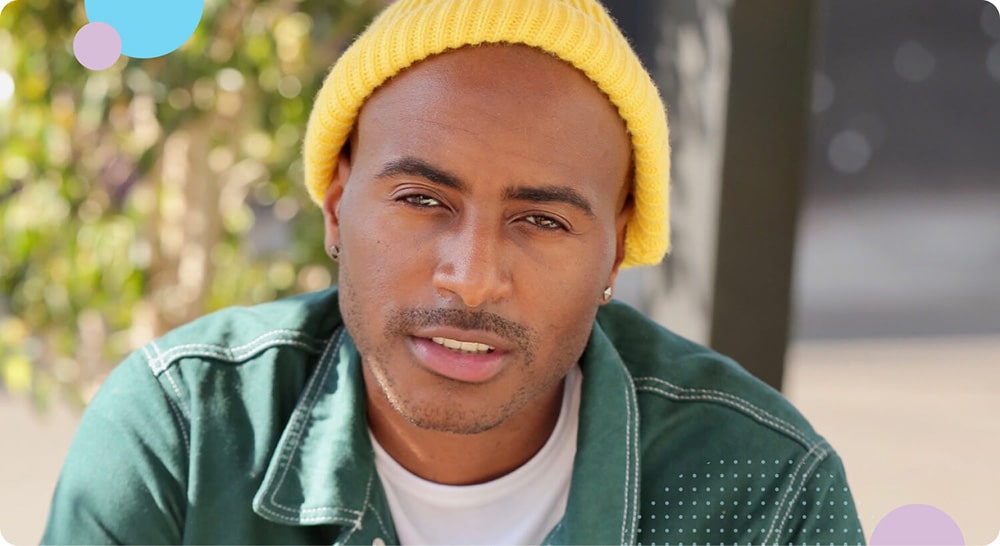
In 2018, Kenneth Todd Nelson was nearing his 34th birthday and had just relocated to Los Angeles from Atlanta when he visited a new doctor for some nasty allergies he had developed in recent weeks.
After examining Nelson’s sinuses, the doctor was about to end the visit when he asked “Is anything else going on?”
“I don’t know what made me think of it but I said, ‘Yeah, I have this little bump right here,’” Nelson told K Health.
One in every 100 breast cancer patients is a man. This year, the American Cancer Society estimates nearly 3,000 men in the U.S. will be diagnosed with breast cancer and about 500 will die. The survival rate for men with breast cancer is 84%
The doctor asked Nelson to remove his shirt so he could inspect the bump and said, “I think you’re okay, but let’s just get this checked out just in case. This may seem a little weird, but we’re going to have to do a mammogram just to see.”
That was the beginning of Nelson’s breast cancer journey: biopsy, stage II breast cancer diagnosis, lumpectomy, radiation, and chemotherapy. Three years after the initial diagnosis, he sat down with K Health to tell his story so other men like him will know what to look out for so they can get the care they need when it matters most.
Having the Courage to Say You Need Help
Early detection is key to better outcomes with breast cancer. Early detection can mean a survival rate of 90% or higher; stage 4 breast cancer has a 28% survival rate.
“When we’re younger, they teach men to be quiet, to suffer in silence,” Nelson said. “It’s important because a lot of men don’t go to the doctor. They think it’s a sign of weakness and want to be tough. So they may unknowingly have breast cancer or potentially be misdiagnosed. They don’t find out until later on.”
As a man battling a disease that’s usually seen as one only women get, Nelson sometimes felt isolated and alone. At first, he didn’t tell anyone in his life about his diagnosis, not even his 13-year-old son.
Nelson went to his chemotherapy appointments alone. “You’re there for five hours, sometimes more,” he said. “You’re the only man. And you retreat a little because you’re the only one. And that was what I did. I don’t know if it was shame, but I just didn’t feel part of the community. And when you don’t feel part of something, you kind of stand back. And if you’re standing on the outside, you’re not getting the benefit of that shared experience.”
Fortunately for Nelson, cancer is not the kind of thing that’s easy to hide from people who care about you.
“I posted a picture on Instagram, and I had lost probably about 20 pounds within a few weeks,” Nelson said. “You could see it. And people were like, ‘Something’s not right.’ They speculated a lot—they thought I had all kinds of other things going on.”
Despite his initial trepidation, that’s when Nelson started telling friends and family what was really going on. Immediately, they rallied around him.
“Everyone was helping,” Nelson said. “One of my friends ended up paying all of my bills—she took care of my rent, my food, whatever I needed. Because when you’re going through this, at least for me, I didn’t have the resources financially.”
Aside from the practical support, the emotional support Kenneth found in sharing his diagnosis unlocked the strength he needed to keep fighting.
“It was such a release,” he says. “I wish I had done it sooner so I could have gotten the support I needed before reaching that breaking point. Because people who love you, they want to be there for you.”
On Being a Man Who Survived Breast Cancer
In addition to fighting the disease, Nelson struggled to maintain his identity while everything was changing around him.
“One thing my doctor told me was, ‘As much as you can, continue doing everything that you’re doing on a regular day, because it will help keep your mindset together,’” Nelson said.
At first, that’s what he did, pretending that he wasn’t even sick. But after he revealed what was going on to his friends and family, there was a shift.
“There was a day, the Saturday of the second week of my second round of chemo. That’s when it hit me. It felt like a ton of bricks hit me and I’m like, ‘Oh, I’m sick.’ I really was sick,” he said.
Three years past diagnosis, Nelson’s cancer is undetectable.
“I don’t consider myself a survivor, I’m a thriver,” he said. “Because when you survive, you’re still holding on to something. When you thrive, you’ve found freedom from your experience.”
A huge part of this will to thrive, Nelson said, has been connecting with other men who have gone through similar experiences through the Male Breast Cancer Coalition.
“It was a lifeline,” he said. “It’s so important to include us in the conversation because we want to be heard.”
